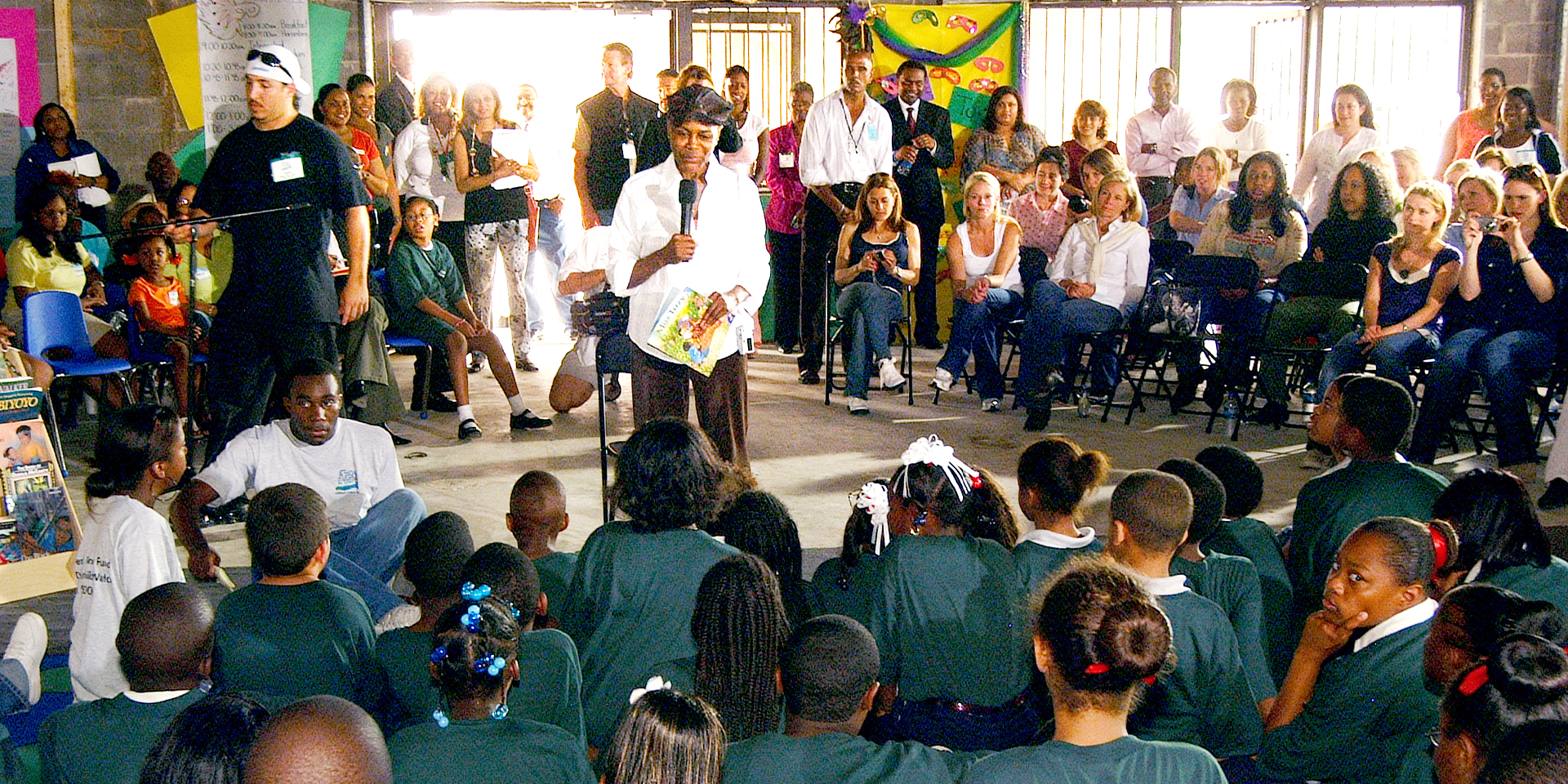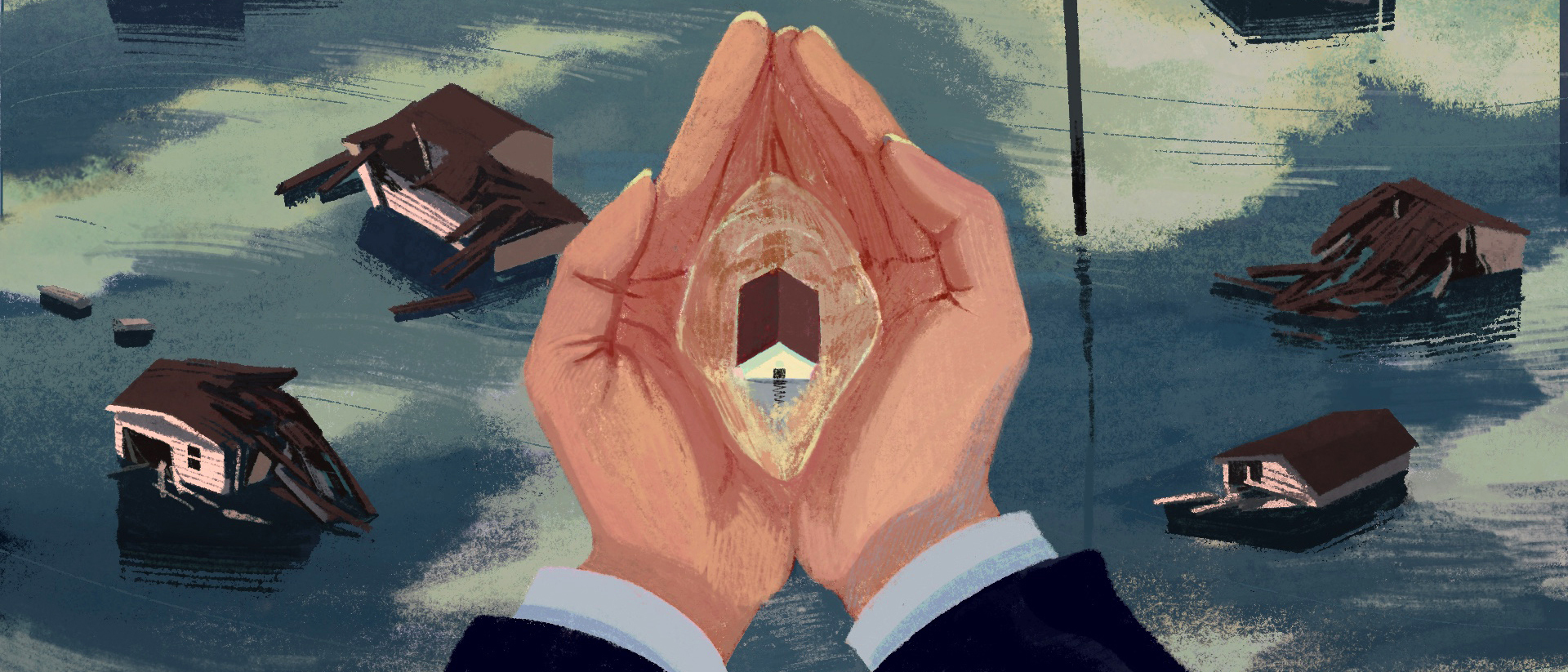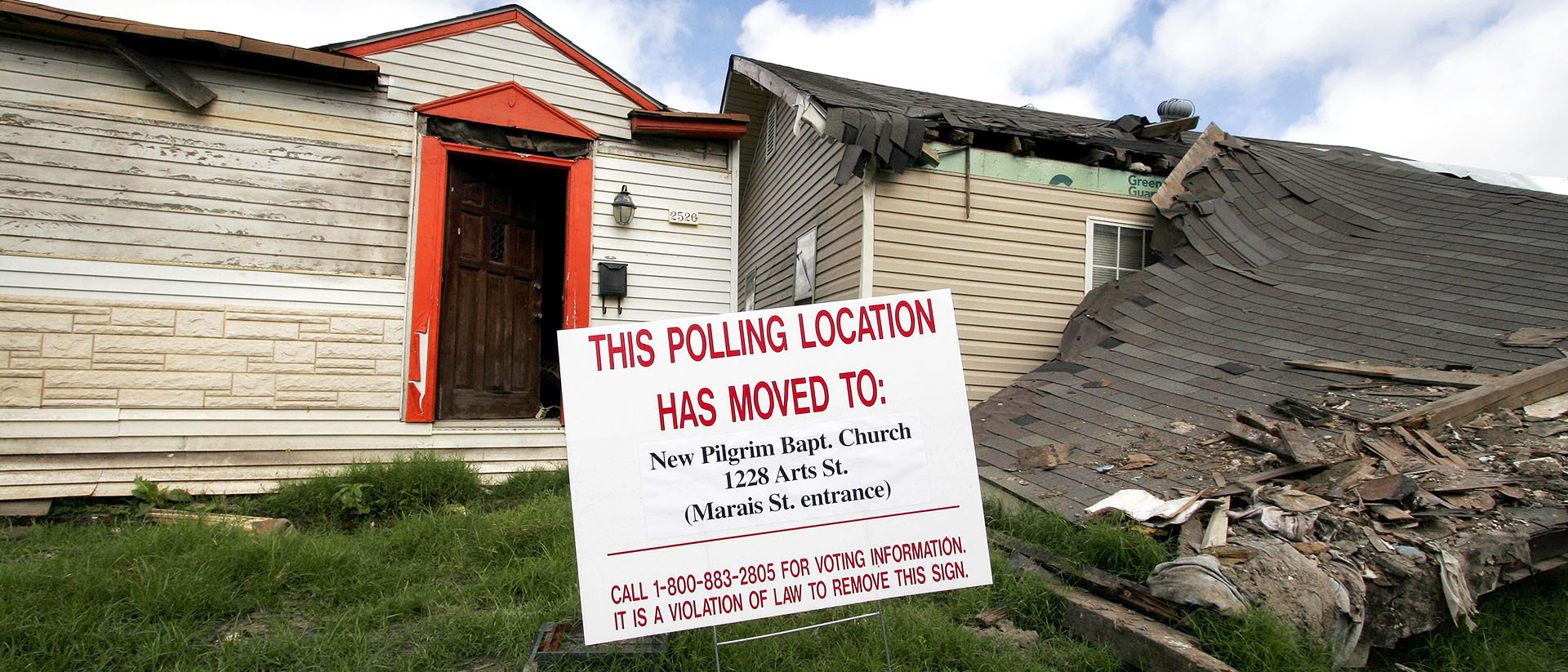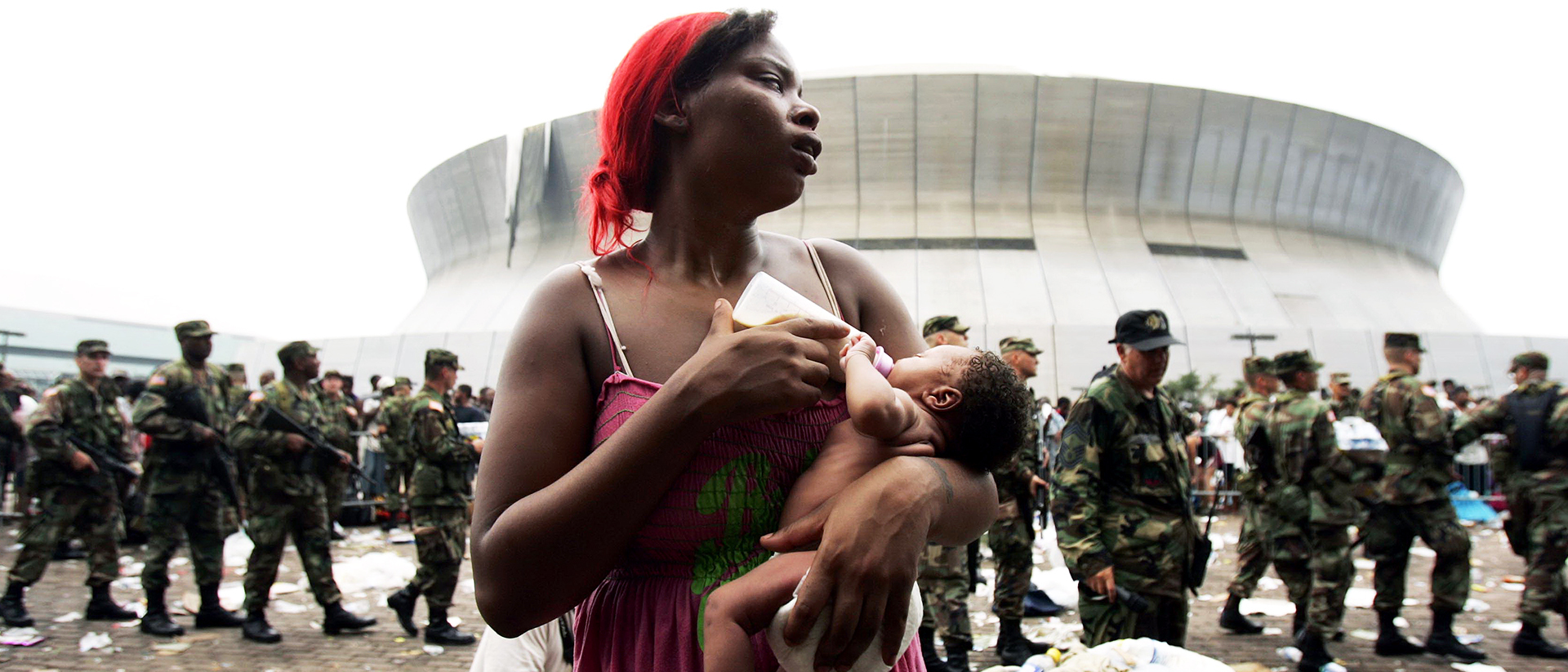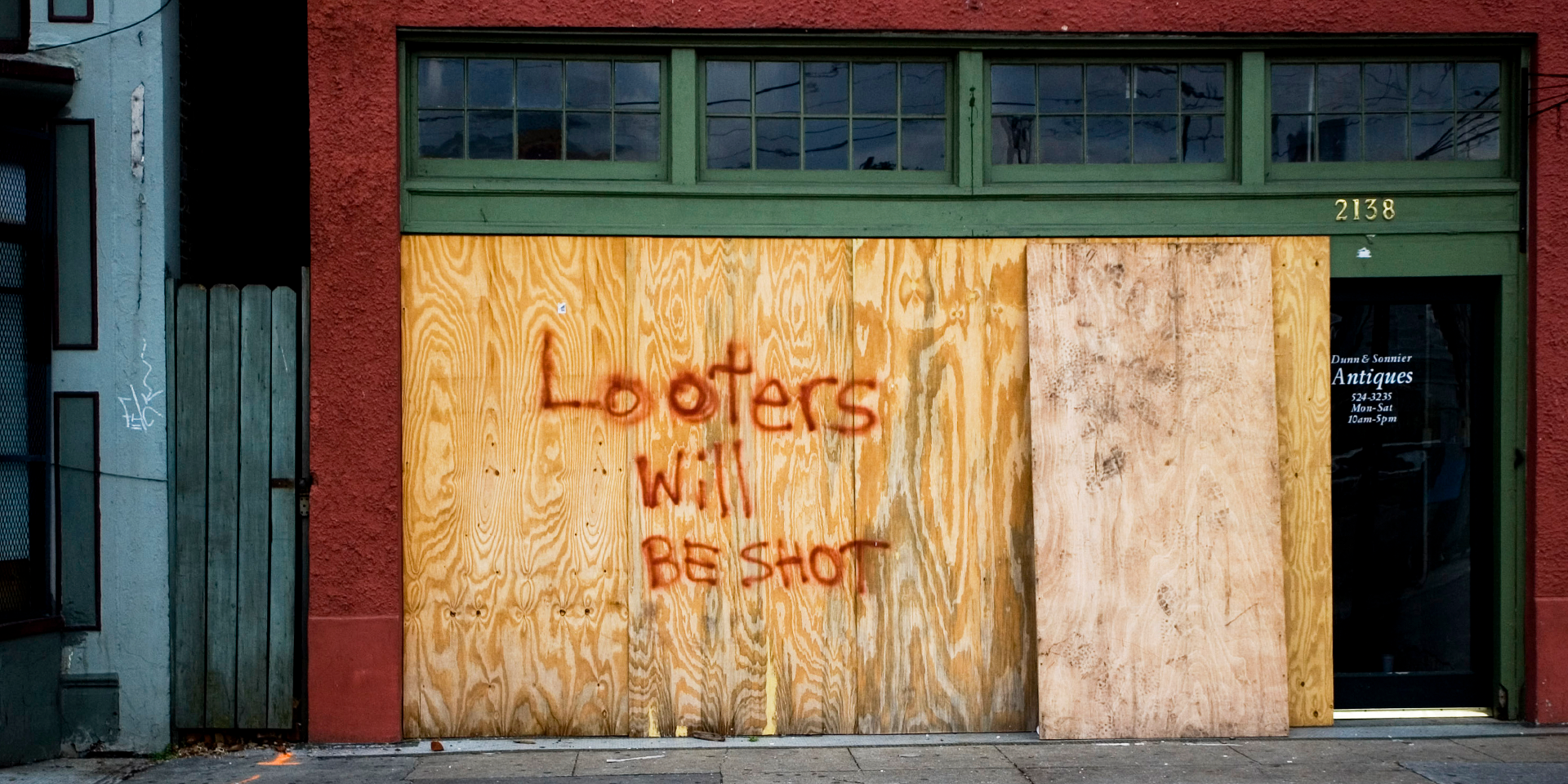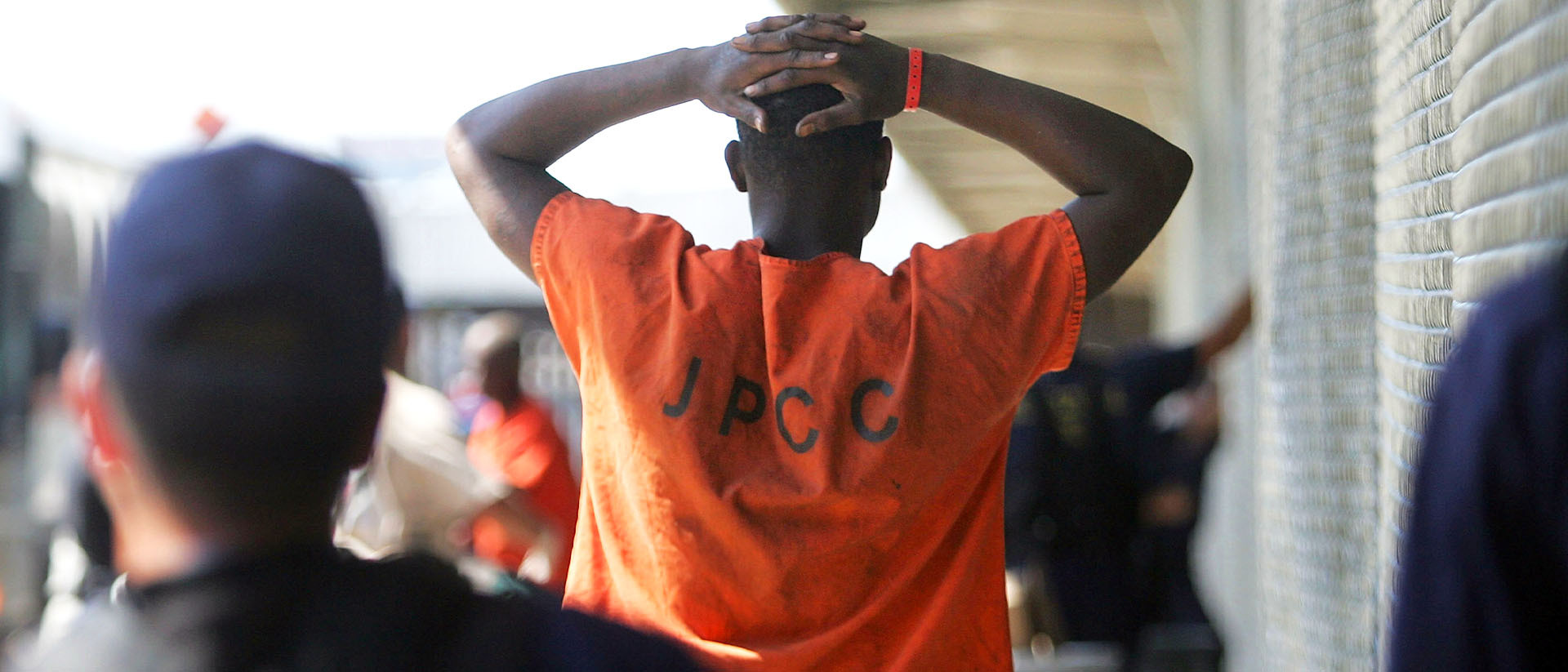Katrina revealed the devastating consequences of neglect; now, we must ensure that our policies reflect a commitment to justice, equity and resilience.”
Hurricane Katrina was more than a natural disaster; it was a moment that exposed the deep systemic inequities in Louisiana’s infrastructure, governance, and social policies. The storm’s aftermath highlighted racial and economic disparities, weaknesses in emergency response and the long-term consequences of divestment in public services. Over two decades later, the policy priorities established by the SPLC’s Louisiana Policy department reflect the need to address many of the same structural issues Katrina revealed, particularly in the areas of democracy, criminal legal system reform, poverty reduction, and access to basic necessities such as food, housing and education. By reflecting on the lessons of Katrina, we can better understand why these policy priorities are crucial for building a more resilient and equitable Louisiana.
Securing Democracy and Ensuring Voting Rights
The response to Hurricane Katrina was marred by widespread displacement, particularly among Black and low-income communities. Many survivors faced significant barriers in reestablishing their voting rights due to bureaucratic challenges, lost or destroyed documents, residency issues, and voter suppression tactics. The chaotic handling of post-Katrina elections led to concerns about disenfranchisement, as thousands of displaced Louisianans were unable to cast their votes in local and state elections that shaped the recovery process.
The SPLC’s priorities for Louisiana highlight the ongoing struggle to protect voting rights, particularly for marginalized communities. Policies such as same-day registration, absentee voting expansion, and restoring voting rights for formerly incarcerated individuals are essential in ensuring that all residents have a voice in the democratic process. Just as Katrina disproportionately affected Black communities, voter suppression efforts continue to target these same populations, making proactive reforms critical in safeguarding democracy. State and local election officials must take proactive measures to make voting more accessible and to ensure that election administration is adequately funded, rather than reinforcing barriers that keep historically disenfranchised communities from participating in elections that directly impact their future.
Transparency and Accountability in Law Enforcement
Katrina exposed the failures of Louisiana’s law enforcement and criminal legal systems, with reports of police brutality, racial profiling and excessive use of force in the storm’s chaotic aftermath. The widespread human rights violations — including officers preventing evacuees from crossing bridges and shooting unarmed civilians — underscored deep-seated issues of racial injustice and lack of oversight in law enforcement. Prior to Hurricane Katrina, the New Orleans Police Department (NOPD) faced long-standing challenges, including allegations of excessive force, racial profiling and corruption. In one high-profile incident, an officer was convicted after ordering the murder of a woman in 1994 who had witnessed him brutally beating a 17-year-old boy. Unfortunately, the post-Katrina era did not usher in much change. In 2011, a U.S. Department of Justice investigation found patterns of unconstitutional conduct within the NOPD, including excessive force and biased policing. This pattern continues. Despite reforms, concerns about racial disparities persist. In 2023, nearly 90% of use-of-force incidents involved Black individuals, in a city where Black residents constitute over 50% of the population.
Living in the Wake: The Enduring Legacy of Hurricane Katrina is a series of essays that examine what the failures of the past can teach leaders about creating the kinds of inclusive, forward-thinking policies New Orleans needs to transform communities that have endured decades of neglect. Read all the essays.
The lack of accountability for these actions mirrors the broader challenges Louisiana still faces regarding policing and mass incarceration. The SPLC’s policy priorities emphasize the need for comprehensive data collection on law enforcement activities, independent oversight, and measures to diversify police forces. Implementing these reforms is necessary to prevent the types of abuses seen during and after Katrina and to build trust between communities and law enforcement. Specifically, police departments must be required to maintain and publish records on stops, arrests, use of force, and complaints to ensure transparency and accountability.
Addressing Poverty and Economic Disparities
Katrina revealed the devastating consequences of long-term economic neglect of Louisiana’s most vulnerable communities. The slow and uneven recovery efforts disproportionately harmed low-income residents, particularly Black families who faced barriers to accessing federal, state and local aid and rebuilding programs. Many lacked access to financial resources, and systemic inequities in insurance payouts further hindered recovery for marginalized groups. Without intentional policy interventions, these disparities have persisted, leaving large portions of the population struggling to achieve economic stability.
Today, Louisiana continues to be plagued by high poverty rates, inadequate social safety net programs that provide income and food security, and an insufficient minimum wage. Despite billions in federal investment post-Katrina, poverty in New Orleans remains entrenched, particularly among Black residents. According to recent reports, nearly 30% of Black Louisianans live in poverty, compared to 13% of white Louisianans. The Black-white income gap in Louisiana is incredibly wide, with white households earning a median household income of over $67,000 in 2022 compared to $36,000 for Black households.
Based upon census data, prior to Hurricane Katrina in 2005, the income gap between Black and white households in New Orleans was already wide and reflected broader racial inequities across the region. Decades later, the income gap has increased significantly — and in some ways is even more entrenched. According to recent research from The Data Center of Southeast Louisiana, the median income for white households in Orleans Parish is more than double that of Black households in 2023 — $97,494 compared to $38,092 for white and Black households, respectively — representing a disparity that has increased from pre-Katrina years. This widening gap suggests that economic growth in the region has not been inclusive or equitably distributed.
As a result, our state policy priorities focus on eradicating poverty by strengthening food security programs, protecting social welfare benefits, and ensuring that local, state and federal resources are adequately funded and that services are effectively utilized. Expanding affordable child care, investing in workforce development programs, and increasing wages are essential steps in breaking cycles of poverty and improving long-term economic stability for Louisiana’s working families.
Housing and Homelessness
One of Katrina’s most enduring legacies is the housing crisis that followed. Thousands of residents were displaced, and many never returned due to unaffordable housing and discriminatory rebuilding policies. The mass demolition of public housing and lack of investment in affordable housing exacerbated homelessness and deepened economic segregation. Additionally, in areas outside New Orleans, the mass migration from the city created additional strain on housing markets and public services. Many people displaced from New Orleans had limited access to affordable housing options, which led to increased demand and rising rent prices, increasing economic segregation. For example, Baton Rouge saw a population surge of about 200,000 people post-Katrina, many of whom struggled to find permanent housing.
Furthermore, smaller cities and towns outside of New Orleans often did not see the same level of investment in rebuilding infrastructure. In rural communities like Pointe Coupee or Terrebonne Parish, recovery from storm damage is often slower, impacting where residents can affordably live, rebuild, and maintain their communities. This lack of investment in infrastructure, particularly in housing and transit, slowed recovery for many smaller towns, leaving many communities stuck in economic decline while large-scale recovery focused on New Orleans.
In summary, the policy decisions made after Hurricane Katrina, including the demolition of public housing and a lack of investment in affordable housing, had a devastating ripple effect in smaller cities and towns. Surrounding communities were not prepared for the large influx of displaced people and often did not receive the resources needed to address the housing crisis, deepening economic segregation and exacerbating issues of homelessness.
In 2025, Louisiana faces a similar crisis as inflation, stagnant wages and insufficient affordable-housing options push more residents into homelessness. Instead of criminalizing individuals experiencing homelessness, as some recent policies have done, our state and cities must invest in affordable housing solutions, emergency shelter programs, and rental assistance initiatives. The SPLC advocates for a more humane approach, reinforcing the dignity of all residents by ensuring access to safe and affordable housing. Implementing a housing-first model and securing federal, state and local funding for permanent supportive housing solutions would help prevent the type of long-term displacement that occurred after Katrina and create a more stable foundation for Louisiana’s most vulnerable populations.
Youth Justice and Education Reform
Katrina disrupted the education of thousands of students, many of whom were forced to relocate and experienced significant learning losses. The crisis also led to a controversial overhaul of New Orleans’ public school system, with an expansion of charter schools that remains a subject of debate. While some argue that these reforms improved education outcomes, the privatization of schools has reduced community control and accountability, leaving marginalized students at a disadvantage.
After Hurricane Katrina, New Orleans became the first major U.S. city to convert nearly all of its public schools into charter schools. This was promoted as a model for innovation and equity. However, despite some gains in graduation rates and test scores, Black students in New Orleans still face significant achievement gaps. For instance, pre-Katrina (2004-2005), around 90% of New Orleans’ public school students were Black, with the majority attending underperforming schools, especially in predominantly Black neighborhoods. As of 2023, despite the reforms and shift to the charter-based system, the achievement gap remains significant. In fact, 76% of students in F-rated schools are Black, compared to 34% of students in A-rated schools who are Black. Black students are overrepresented in lower-performing charter schools, while white students disproportionately attend higher-performing, selective schools.
Our policy priorities emphasize the need for an inclusive, well-funded public education system that provides equitable opportunities for all students. In addition, Louisiana’s rollback of the Raise the Age Act in 2024 — allowing 17-year-olds to be tried as adults — reflects a broader trend of punitive approaches to youth justice that disproportionately harm Black and low-income children, and youth with disabilities. Investing in diversion programs, mental health services, and restorative justice practices would help break the cycle of incarceration and provide young people with the support they need to succeed. Expanding access to early childhood education and increasing state investment in public schools will also ensure that all students, regardless of background, receive a high-quality education that prepares them for the future.
Conclusion
The themes exposed by Hurricane Katrina — racial and economic inequality, governmental failures, and the need for systemic reforms — are still relevant today. The SPLC works to address many of these same issues, emphasizing anti-poverty investments, housing policies, voter access and election practices, law enforcement accountability, criminal legal system reform, and education policy. By learning from the past and implementing forward-thinking policies, Louisiana can build a future where all residents have the opportunity to thrive, regardless of race, income or geography. Katrina revealed the devastating consequences of neglect; now, we must ensure that our policies reflect a commitment to justice, equity and resilience.
Through community empowerment, dedicated advocacy, and strategic policymaking at the local and state levels, Louisiana can correct past injustices and create a more inclusive, forward-looking state that prioritizes its people over politics. If we fail to act now, we risk repeating the same mistakes that have held us back for too long. It is time to move forward with purpose, addressing long-standing disparities and ensuring that all Louisianans — especially those most often left behind — can build a better future.
How to effect change?
- Center the experiences, leadership, needs, policy agenda, and collective voice of directly impacted individuals when developing administrative or legislative policies at the local, state and national levels.
- Invest in community-based services to safeguard the dignity and human rights of vulnerable communities.
Terry C. Landry Jr. is the former Louisiana Policy Director for the SPLC and the current Louisiana State Representative for District 67.
Illustration by Tara Anand.




